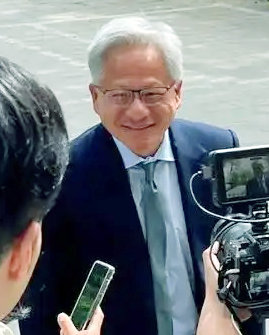Nvidia CEO meets Chinese vice premier amid AI export restrictions
Nvidia CEO meets Chinese vice premier amid AI export restrictions
Posted April. 19, 2025 07:12,
Updated April. 19, 2025 07:12

Nvidia CEO Jensen Huang, whose company has been directly impacted by the United States’ export controls on artificial intelligence (AI) chips to China, visited Beijing and met with Chinese Vice Premier He Lifeng on April 17. Despite the ongoing U.S.-China trade tensions, Huang is deepening his collaboration with Chinese partners, including Liang Wenfeng, founder of the Chinese AI startup DeepSeek, which has also felt the impact of the U.S. chip export restrictions.
According to state-run Xinhua News Agency, Huang expressed optimism about China's economic future during his meeting with Vice Premier He, stating, “We will continue to develop the Chinese market and play an active role in promoting U.S.-China economic and trade cooperation.” In response, He welcomed Nvidia’s efforts, saying, “We encourage Nvidia and other U.S. companies to deepen their engagement in China, leverage their industrial strengths here, and seize opportunities to lead in global competition.”
Huang’s visit follows the U.S. decision to extend export controls on AI chips, including the H20 model designed for the Chinese market. Notably, Huang appeared in a formal suit instead of his usual black leather jacket, signaling the importance of this diplomatic meeting. This marks his first trip to China in three months, with his last visit in January, when he stopped in Taiwan before traveling to Beijing and Shanghai. Although Huang visited China again in 2023 and 2024, this is the first time his meetings with top Chinese leadership have been made public. According to the Financial Times, “Huang had previously avoided publicizing meetings with senior Chinese officials, but this visit followed the Chinese State Council’s approval of Nvidia’s request for talks.”
On the same day, Huang also met with Ren Hongbin, chairman of the China Council for the Promotion of International Trade (CCPIT), where he praised China as “one of the world’s largest consumer markets, with an advanced industrial ecosystem and leading software capabilities that power our innovation.” Huang emphasized, “Although U.S. export controls have had a significant impact on our business, we remain unwavering in our commitment to serve the Chinese market.”
During his visit, Huang also discussed the development of new AI semiconductor designs with Liang Wenfeng, whose AI models had previously used Nvidia’s H20 chip, which is now included in the U.S. export controls. Nvidia’s business in China is significant, as the country accounts for approximately 13% of the company’s annual revenue, underscoring the importance of the Chinese market to Nvidia.
Chul-Jung Kim tnf@donga.com







